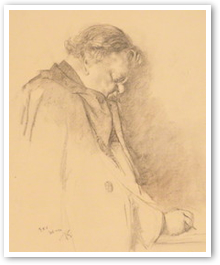The first progressive generation
- G.K. CHESTERTON
A generation is now growing old, which never had anything to say for itself except that it was young.
 It was the first progressive generation — the first generation that believed in progress and nothing else…. [They believed] simply that the new thing is always better than the old thing; that the young man is always right and the old wrong. And now that they are old men themselves, they have naturally nothing whatever to say or do.
It was the first progressive generation — the first generation that believed in progress and nothing else…. [They believed] simply that the new thing is always better than the old thing; that the young man is always right and the old wrong. And now that they are old men themselves, they have naturally nothing whatever to say or do.
Their only business in life was to be the rising generation knocking at the door. Now that they have got into the house, and have been accorded the seat of honour by the hearth, they have completely forgotten why they wanted to come in. The aged younger generation never knew why it knocked at the door; and the truth is that it only knocked at the door because it was shut. It had nothing to say; it had no message; it had no convictions to impart to anybody….
The old generation of rebels was purely negative in its rebellion, and cannot give the new generation of rebels anything positive against which it should not rebel. It is not that the old man cannot convince young people that he is right; it is that he cannot even convince them that he is convinced. And he is not convinced; for he never had any conviction except that he was young, and that is not a conviction that strengthens with years.
 This is Meaghen Gonzalez, Editor of CERC. I hope you appreciated this piece. We curate these articles especially for believers like you.
This is Meaghen Gonzalez, Editor of CERC. I hope you appreciated this piece. We curate these articles especially for believers like you.
Please show your appreciation by making a $3 donation. CERC is entirely reader supported.

Acknowledgement
G.K. Chesterton. "The first progressive generation." Illustrated London News (July 9, 1921).
Reprinted in The Collected Works of G.K. Chesterton, Ignatius Press, 1990.
The Author

 Gilbert Keith Chesterton (1874-1936) was an English author whose prolific and diverse output included philosophy, ontology, poetry, play writing, journalism, public lecturing and debating, biography, Christian apologetics, fantasy and detective fiction. Chesterton has been called the "prince of paradox". He loved to debate, often engaging in friendly public disputes with such men as George Bernard Shaw, H. G. Wells, Bertrand Russell and Clarence Darrow. Among the 80 books he wrote are: Orthodoxy, The Everlasting Man, The Man Who Was Thursday, The Ballad of the White Horse,Saint Thomas Aquinas: The Dumb Ox and Saint Francis of Assisi, What's Wrong with the World, The Catholic Church and Conversion, and The Well and the Shallows.
Gilbert Keith Chesterton (1874-1936) was an English author whose prolific and diverse output included philosophy, ontology, poetry, play writing, journalism, public lecturing and debating, biography, Christian apologetics, fantasy and detective fiction. Chesterton has been called the "prince of paradox". He loved to debate, often engaging in friendly public disputes with such men as George Bernard Shaw, H. G. Wells, Bertrand Russell and Clarence Darrow. Among the 80 books he wrote are: Orthodoxy, The Everlasting Man, The Man Who Was Thursday, The Ballad of the White Horse,Saint Thomas Aquinas: The Dumb Ox and Saint Francis of Assisi, What's Wrong with the World, The Catholic Church and Conversion, and The Well and the Shallows.




